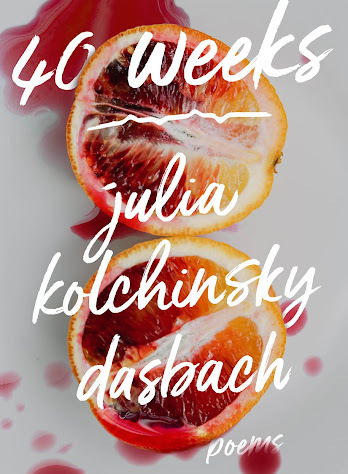Julia Kolchinsky Dasbach, 40 Weeks
Nature must be a mother
to pour : thunder : punch
through potholes : hopingthis
will make something :anything
: grow : she must be moths: mouth
wide : wings panting forlightning :
who else would strikeherself : flame
veining the air? who elsewould bear
children to rise inspring : only to feel them
cut months later? themoth’s
charred outline on a log: the double
wound : her children’shead sinking
: left to dry on anothermother’s
windowsill : who elsewould ask
for such a violence?
 Granville, Ohio-based poet Julia Kolchinsky Dasbach’s third full-length poetry title,following (Kent State University Press, 2019)and
Don’t Touch the Bones
(Lost Horse Press, 2020), is
40 Weeks
(PortlandOR: YesYes Books, 2023), a book-length poem on pregnancy and the difficultiesof waiting, wanting, catching and becoming. 40 Weeks follows pregnancy,a loss, and a further pregnancy, offering her poem-titles as individual andconsecutive weeks, each named and sized after a corresponding vegetable-to-fetussize, from “Week 4: Poppy Seed” and “Week 9: Grape” to “Week 14: Lemon” and “Week28: Eggplant.” Across this book-length suite, Dasbach composes a mapping of anintimate space, and the emotional and physical complexities and interruptionsof everything that pregnancy, mothering and motherhood involves and surrounds. Shewrites violence and loss, swirls of surrender and survival. As the short single-sentenceof the poem “Week 21: Carrot” ends: “into the street with your sun / still insidehis laughter / brought icicles down / from a neighbor’s gutter / they shattered/ irreparable / far from his body / unprotected and wholly / outside of you /inside / her fingerprints / became / permanent [.]”
Granville, Ohio-based poet Julia Kolchinsky Dasbach’s third full-length poetry title,following (Kent State University Press, 2019)and
Don’t Touch the Bones
(Lost Horse Press, 2020), is
40 Weeks
(PortlandOR: YesYes Books, 2023), a book-length poem on pregnancy and the difficultiesof waiting, wanting, catching and becoming. 40 Weeks follows pregnancy,a loss, and a further pregnancy, offering her poem-titles as individual andconsecutive weeks, each named and sized after a corresponding vegetable-to-fetussize, from “Week 4: Poppy Seed” and “Week 9: Grape” to “Week 14: Lemon” and “Week28: Eggplant.” Across this book-length suite, Dasbach composes a mapping of anintimate space, and the emotional and physical complexities and interruptionsof everything that pregnancy, mothering and motherhood involves and surrounds. Shewrites violence and loss, swirls of surrender and survival. As the short single-sentenceof the poem “Week 21: Carrot” ends: “into the street with your sun / still insidehis laughter / brought icicles down / from a neighbor’s gutter / they shattered/ irreparable / far from his body / unprotected and wholly / outside of you /inside / her fingerprints / became / permanent [.]”Setin a sequence of weeks, Dasbach articulates poems about and around pregnancyand motherhood that ripple out into poems about how precarious and wonderful itis to live, and live deeply, allowing every part of her to surrender to anexperience that overtakes every cell. “Four times they drew,” she offers, toopen “Week 31: Coconut,” “checking blood / for sweetness—how quickly / the bodycan dissolve / what feeds it.” There is such a delicate precision to thesepoems, simultaneously hard-set and tender, as Dasbach composes poems ofbecoming and becoming more; of being and the slow difficulty and clear beautyof pregnancy and motherhood, along with all the confusion, insecurity, heartbreakand all else that can’t help but come. “You’ve been leaking / for weeks now,”the poem “Week 38: Leek” begins, “secreting, sieving, / seeping, sweating even/ in the absence / of heat. You’ve been / leaving yourself / on every fabric, /spending more time / surrounded / by water / so what escapes / comes home.” Dasbach’s40 Weeks really is a breathtaking collection of documented moments inset lyric, even through the rush of attempting to document each moment as itoccurs, before it moves on to the next, and remains in no other form but throughmemory, or here.



